Christmas Eve 1944: How singing ‘Silent Night’ saved American POWs during the Battle of the Bulge
In blessed memory of Keith Ginther of Montana: “He’d seen the way the Jewish-American soldiers disappeared from the prison camps”
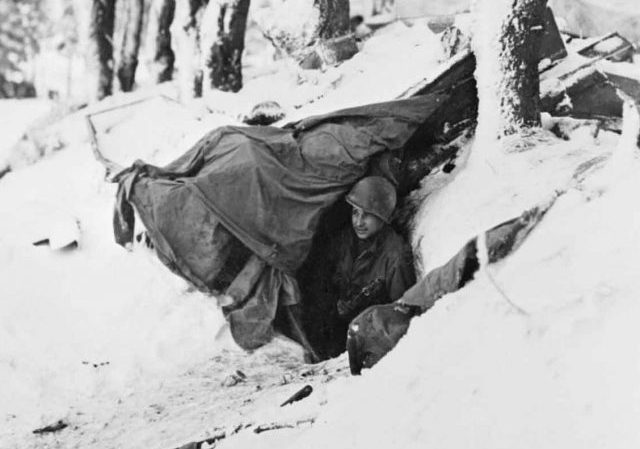
On Christmas Eve 1944, U.S. troops were in the freezing cold of the Ardennes forest during the Battle of the Bulge, waist-high in snow.
We have remembered and told that story on recent Christmas Eves:
I encourage you not only to read the posts and the comments, but also the comments to our prior Facebook threads [here and here] and our current Facebook thread [here] in which people recounted their family experiences.
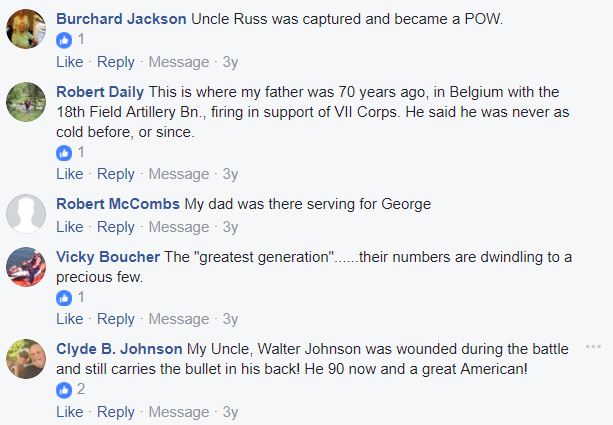
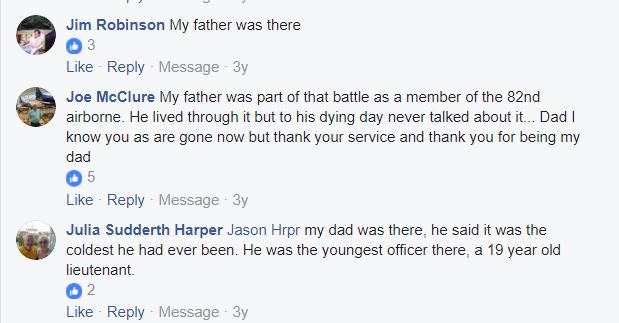
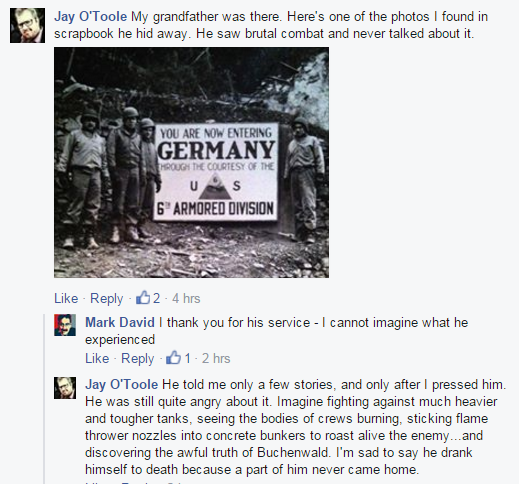
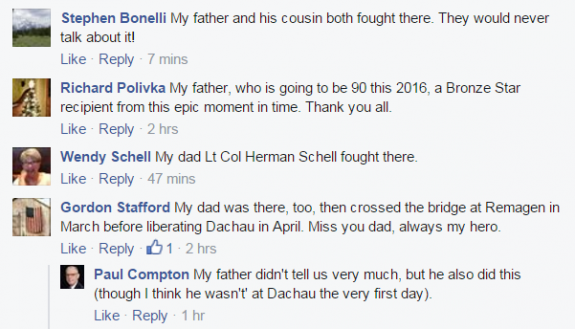
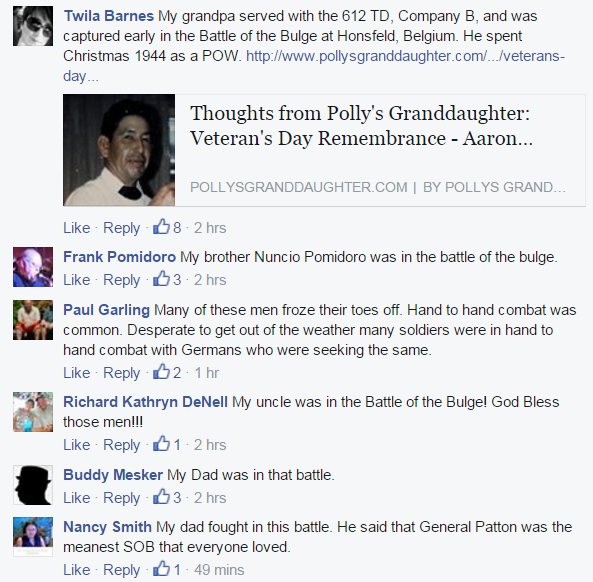
We also previously remembered Christmas in German POW camp Stalag Luft 1, particularly Lt. Elroy Frank Wyman from Maine, murdered by a German guard.
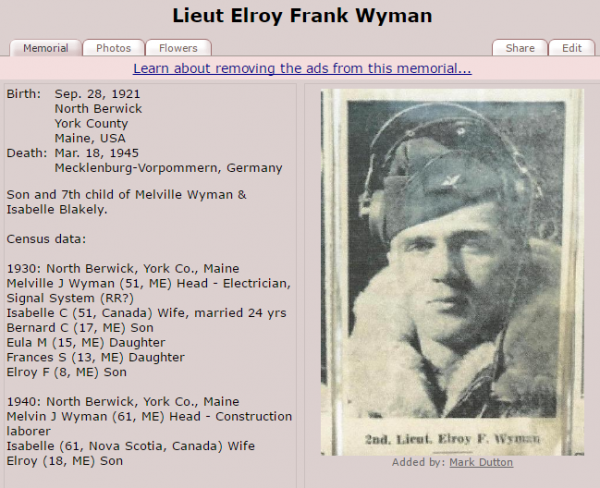
An Unlikely Silent Night, as told by Keith Ginther
In preparing today’s post, I looked for something beyond the war stories.
And I found a story that took place while American POWs captured during the Battle of the Bulge were marched to Germany.
[German propaganda film][longer video here]
The story was told in 2011 by Keith Ginther of Montana, and was republished on his death in July 2014 by The Great Falls Tribune:
Quiet, dependable, faithful rancher Keith Ginther died Sunday in Choteau. His passing brought to mind this story, which we featured Christmas 2011. I had known him for many years in a vague sort of way. He never had much to say. And then at Christmas one year, he suddenly started talking. He seemed shocked later by all he’d reveled [sic] but proud to have told his story, too. — Kristen Inbody
Here’s an excerpt from his story (emphasis added):
In December 1944, Ginther became one of the 23,000 Americans captured or missing by the end of the Battle of the Bulge, Germany’s final and ultimately unsuccessful offensive on the Western Front.
He began a 150-mile march into Germany 67 years ago this month. He remembers feeling humbled in defeat, even more so as the POWs met German artillery pulled by horses or one truck pulling another on its way to the front….
The column of POWs passed through a countryside devastated by war and damaged by Allied bombing. At one village, the POWs had to clear rubble so German artillery could pass through. An American bomber pilot joined the prisoner ranks.
“The people seemed to be more hostile to airmen, whom they blamed for being bombed,” Ginther said.
Germans harassed the downed pilot. They’d rush the sides of the column, trying to grab him.
The villagers were starving, exhausted and angry.
When the hostility was at its worst, all the prisoners had reason to be afraid — though none so much as the captured bomber pilot.
Yet at that moment, an American in the ranks began singing “Silent Night.”
“Pretty soon the Germans were singing ‘Silent Night’ too, so it calmed things down,” Ginther said. “Halfway through the first verse, you could hear the German words, too.”
If not for the song, which for one moment brought a measure of peace to a one small corner of Germany, “I don’t really know what would have happened,” he said. “The guards would have tried, I guess, to protect him.”
Read the rest of Ginther’s memories at the link.
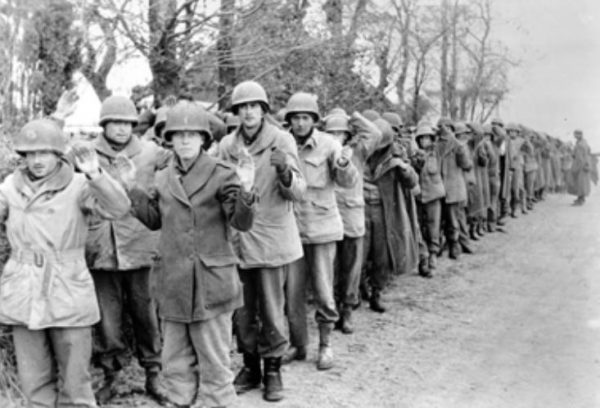
American prisoners of war are marched back into Germany after their capture during the Battle of the Bulge in the winter of 1944. [Army photo]
The Fate of Jewish-American POWs
This unlikely singing was but a fleeting moment of humanity, as Ginther recalled this:
And he’d heard about the concentration camps. He’d seen the way the Jewish-American soldiers — even just those who looked vaguely Jewish — disappeared from the prison camps.
“Germans figured out a certain percent would be Jewish, so they would try to figure out who they were,” he said. “If they couldn’t tell, they’d find troublemakers to weed out to make the quotas.”
That mention led me to more information about the fate of Jewish-American POWs:
About 350 American POWs who either were Jewish or appeared to be to their German captors were imprisoned in the Buchenwald concentration camp during World War II, according to survivors who have begun telling their stories in a series of special reports on CNN.
Anthony Acevedo, a medic in the 70th Infantry Division during the war, was the first survivor to step forward with the grisly tale of the American soldiers held at Berga an der Elster, a subcamp of Buchenwald. After being captured during the Battle of the Bulge, Acevedo says he was sent to a POW camp near Bad Orb, Germany, where he was held with other American soldiers. About a month later, the camp’s commander told the prisoners to line up and ordered all of the Jewish soldiers to take one step forward. When few volunteered, Acevedo says, about 90 Jewish soldiers and more than 250 others the Germans thought “looked like Jews” were put on a train to Buchenwald. Acevedo, a Mexican American, is not Jewish.
And certainly non-Jewish American POWs were treated brutally as well. I learned for the first time of the Malmedy Massacre. Perhaps that is for next Christmas Eve’s post.
Keith Ginther’s Quiet Life in Montana after the War
Ginther’s Obituary states in part:
Keith was born August 26, 1921 to Ernest and Lola (Burton) Ginther in Bartley, Nebraska. At age 8, he moved with his family to their new farm on Redwater near Richey, Montana. After graduating from high school, he joined the US Army in July 1942. Following two months of basic training he served as an MP and then went into Engineer training in the ASTP program. In October 1944, he shipped out to Europe with Co. G 422 Infantry, 106th Division and was taken prisoner on December 21st during the Battle of the Bulge. He was released from German Prison Camp as WW II was ending in May 1945.
After leaving the military, Keith rejoined his family who had moved to their farm near Fairfield, Montana. He bought 3 of the neighboring farms and, following the death of his father, managed the home place for his mother as well, in addition to his work, he also managed to serve in various positions with the Fairfield Cattleman’s Association, and as scorekeeper for the Augusta High Basketball team for many years. He even managed to slip away on the occasional trip to the mountains to hunt or fish, two things he enjoyed. In his later years, he became very active in the Teton Steam and Gas Association and served as Commander of the Big Sky Chapter of the Ex-Prisoners of War.
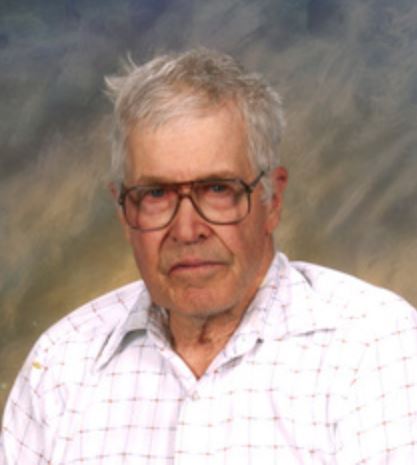
[Keith Ginther]
I’m glad that Keith Ginther finally did, may he rest in peace.
———————
Featured Image: Sergeant John Opanowski of the 10th Armoured Division, emerges from a dug-out built under snow in the Bastogne area. The 10th Armoured Division and the 101st Airborne Division were pinned down in the Bastogne area by General von Manteuffel’s crack Panzer Divisions – the 2nd and the 116th.
 DONATE
DONATE
Donations tax deductible
to the full extent allowed by law.








Comments
Professor Jacobson,
Thank you so much always for featuring the Battle of the Bulge each Christmas. My uncle was there with the 84th Infantry Railsplitters. I have photographs that my cousin, Uncle Hank’s daughter, digitized. His photos are nothing like the images of the frightened POWs in the propaganda film. He is playing in the snow and smiling with his buddies.
One time, I don’t know when, but probably in the 70s, my dad was with my uncle when an old army buddy saw them. The buddy told my uncle, “You were a sonofabitch,but you saved our lives.”
My Uncle AJ got his first purple heart at Bastone. He never talked about the war.
When I got back from Desert Storm he came to visit and had a bottle of late 30’s brandy (I had never known him to drink). We drank that bottle and he told me about Lorraine, Metz, Nancy, Bastone (getting shot in the ass), and Germany. He was 3rd Army with Patton.
Just want to wish all LI followers a Merry Christmas!
Merry Christmas from Central Florida Mark!
My father fought in Korea and Vietnam, and had to lie about his age to fight in the former.
Deepest respect to those who suffered and died for us in WWII.
To Absent Comrades.
/hand salute
My grandfather was a combat medic at the battle of the bulge. He never said a word about it, and we only got the stories from my grandmother after he died. Nonetheless he managed to remain a relentlessly cheerful and active man with an infectious sense of humor and an appreciation for each moment. Perhaps instead of being ‘in spite of’ it was ‘because of’ that he had his appreciation.
HIS fact her served as a lawyer at the Nuremberg trials, and the letters detailing the sheer petty banal evil that was on display from many of those being tried are chilling. These were not mustache twirling movie villains. Perhaps it’s a law of nature that when great evil occurs somewhere there must be acts of great good to balance. One hopes.
my dad was in Oflag 64 Christmas 1944, after being captured in Belgium Oct 25.
“He’d seen the way the Jewish-American soldiers disappeared from the prison camps”
This isn’t really a Christmas story, but it’s close enough. It’s about a group of American Soldiers captured over Christmas 1944 and into the new year.
http://www.aish.com/jw/s/Tell-Me-who-Are-the-Jews-Or-Die.html
“…The group of over a thousand American soldiers were captured in late 1944 and early 1945 in the Battle of the Bulge and transported to the Stalag IXA POW camp near Ziegenhain, Germany. One of their first orders was to separate out the Jewish troops and present them to their German captors.
The German camp commander, Major Siegmann, delivered the order in English to the ranking American serviceman in the camp. This was Master Sergeant Roddie Edmonds, a stocky 24-year-old from Knoxville Tennessee. Remembered by his fellow troops from basic training as a gentle, unassuming soldier, Sgt. Edmonds might have seemed an unlikely candidate for the heroism he was about to display.
According to his son, Rev. Chris Edmonds, who has spent years speaking with witnesses and piecing together what happened that day on January 27, 1945, instead of ordering Jewish troops front and center, Sgt. Edmonds turned to his men and said, ‘We are not doing that, we are all falling out.’
Commanding all the Americans in the POW camp to stand at attention in front of their barracks, Sgt. Edmonds placed himself front and center. Lester Tanner, a Jewish soldier who served with Sgt. Edmonds, later recalled the scene: ‘I would estimate that there were more than 1,000 Americans standing in wide formation in front of the barracks, with Master Sergeant Roddie Edmonds standing in front, with several senior non-coms beside him, of which I was one.’
Major Siegmann strode up to Sgt. Edmonds. ‘They cannot all be Jews!’
Sgt. Edmonds replied to the commander, ‘We are all Jews.’
Enraged, Siegmann took out his pistol and threatened to shoot Sgt. Edmonds. Facing immediate death, Edmonds refused to back down and betray the Jews under his command.
‘According to the Geneva Convention, we only have to give our name, rank and serial number,’ Sgt. Edmonds replied, and recited them. ‘If you shoot me, you will have to shoot all of us and after the war you will be tried for war crimes.’
Paul Stern, a Jewish POW who was standing nearby, recalled those stirring words that saved his life. ‘Although 70 years have passed, I can still hear the words (Sgt. Edmonds) said to the German camp commander.’
After a moment, the Commandant turned and walked away….”
MSGT Edmonds was a little late getting the Jewish troops under his command a Christmas present that winter but I’m sure they were happy to get it when Edmonds finally got around to giving it to them.
“rdm | December 25, 2017 at 4:40 am
…Perhaps it’s a law of nature that when great evil occurs somewhere there must be acts of great good to balance…”
This is one of those acts of great good. MSGT Edmonds was a devout Christian. There was no way he was going to obey such an order. There are only a few Americans honored in Israel as Righteous Among Nations, mostly because few Americans were in a position to save Jews from the Nazis.Most of those few who did receive that honor were missionaries who refused to evacuate. MSGT Roddie Edmonds was one of those few who was in that position. He is the only American Soldier to receive that honor.
Merry Christmas to all. Even those who don’t celebrate Christmas.
Merry Christmas everyone!
And thank you Professor Jacobson for continuing to honor those who had such a large part in our being free and able to have a Merry Christmas.